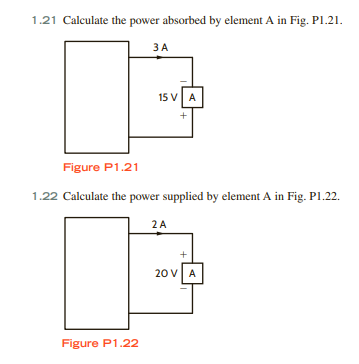I've been working on these end chapter problems from my book and noticed that something is either wrong and contradicting to the concept I was taught, or there is some concept I missed entirely.
Here are the figures for the two problems below:
Notice that for problem 1.21 it says that element A is "absorbing" power and problem 1.22 that it is "supplying" power.
When I do the calculations based on the following rule, Current leaving the "+" side and power > 0, then power is "supplied" otherwise if power < 0 then power is "absorbed"
So 3 A leaves 15 V from the + end and the power, P = VI, is 45 W, 45 > 0 and thus power should be "supplied" but the problem says it is being Amabsorbed.
Again with problem 1.22 but this time, it is entering + so the rule states, current entering the "+" end and power > 0, then power is "absorbed" otherwise if power < 0 then power is "supplied"
So 2 A enters 20 V from the + end and the power is 40 W, 40 > 0 thus power should be "absorbed", but the problem says it is being supplied.
Now back to main question, is it that I am wrong, and through some concept I missed, that problem 1.21 is actually -45 V absorbed and not -45 V supplied, and the same with problem 1.22?

